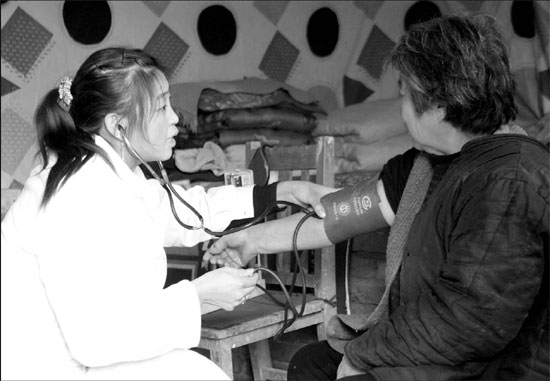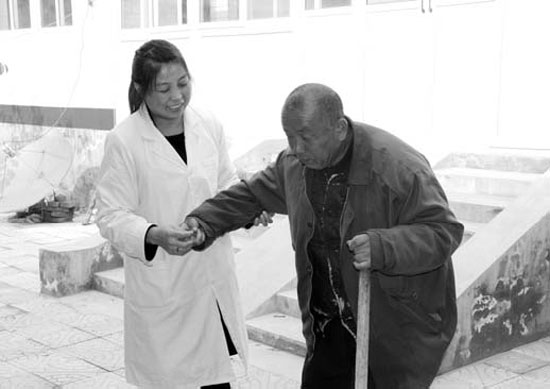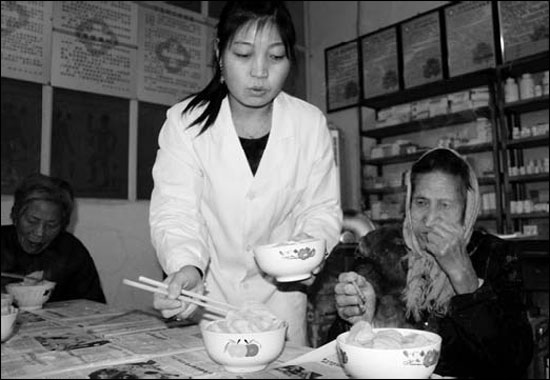Continuing care in the villages
Updated: 2013-02-26 07:57
By Zheng Jinran (China Daily)
|
||||||||
|
Liu Guifang takes a villager's blood pressure while making her rounds in Nanyangbu village, Handan, Hebei province. Photos provided to China Daily |
She is totally committed to her vocation, but she fears there will be no one to take her place when she retires. Zheng Jinran follows a village doctor on her rounds on the first day of the Spring Festival.
While most were still occupied with happy family reunions during the Spring Festival holidays, Liu Guifang in her medical whites was already making the regular rounds of her patients.
The 44-year-old is a village doctor, and she needs to check on her patients, whether it is a public holiday, or not.
"Many of them are isolated seniors living alone without their children, and suffering from some disease," Liu says as she heads towards the home of Wang Chunjing, 84. It is the first day of the Lunar New Year.
Wang, a widower, had a stroke 10 years ago and can no longer walk properly. He lives on the basic allowance from the government and the kindness of his neighbors.
Liu is actually more than just a doctor. She helps Wang with his laundry, some cooking and the little errands of daily life.
"His allowance only covers his basic living requirements, so I don't charge for treatment and give him free medicine," she says.
Wang cannot remember her name, but he is always happy to see Liu in her white coat, and tells her he feels better as long as she comes to visit him. He is one of the more than 70 senior villagers in their 60s to 80s under the doctor's care in Nanyangbu village, Handan, Hebei province. Liu has looked after them all for 27 years.
During these years, she has paid out thousands of yuan for their medicine, and her little clinic makes very little money.
"I don't mind giving them free medicine, because I feel responsible for these old people. We are almost like relatives, and the affection is mutual," she says as she heads toward the next family on her list that afternoon.
She sometimes feels the burden and the inadequacy of taking care of all these empty nesters.
"I plan to build a nursing home for them, and hire caretakers to look after them," she says, adding that the proposal has been submitted to the local government and may be approved by June.
For now, Liu makes full use of her time to continue her rounds, because she knows their individual cases best - thanks to her health records database, which she started about four years ago.
In 2009, taking advantage of the rural health reforms by the government, Liu started keeping comprehensive health records on every villager for her own reference.
"I went to every household to collect their records and bought a computer to keep it organized," she says. She regularly updates records for families with pregnant mothers, children of migrant workers who are left behind at home, and the elderly.
Liu now has a database on more than 2,500 villagers, and these health records will help them get better treatment in the future, especially when new village doctors arrive to take over. Liu is determined to complete the data collection, no matter how long it takes.
She is tireless in her care of the villagers, and responds to their calls at any hour of the day - almost as if she did not need sleep herself.
"If it was possible, I would clone myself to take care of the patients as well as my own family," she says, as bursts of firecrackers remind her that it is time to go home to share dinner with her family on this special day.

"It's the Spring Festival and I want to spend time with my family. But I have to send more medicine to an elderly couple. I feel sorry for them," she says.
But she has support at home, especially from her father-in-law and husband, who were once rural doctors.
"I know how important she is to the villagers, especially those who are unable to go to the hospitals, which makes her more than just my wife," says her husband Sun Zhiyu, who works at Nanyangbu county's hospital.
Although they are a family of doctors, neither her son nor daughter-in-law have shown any interest in continuing Liu's work in the village, mainly because of the poor conditions and pitiful salary. Few young people in the village come to learn from her at her clinic.
Liu worries that there will be no one to take her place looking after the old folks when she retires.
In January, she met with Vice-Premier Li Keqiang in Beijing, along with 17 other village doctors, and highlighted these problems. She was assured the Ministry of Health would take about five years to accord all the 1.3 million village doctors the same remuneration as other workers in public medical institutes.
That, at least, is the silver lining on Liu's horizon.
Contact the writer at zhengjinran@chinadaily.com.cn.
|
Liu Guifang visits Sun Wenzhong, 55, a hemiplegia patient in her village. |
|
During the Spring Festival, Liu Guifang invited some lonely seniors to her clinic and cooked them dumplings. |
(China Daily 02/26/2013 page20)

 In Photos: 7.0-magnitude quake hits Sichuan
In Photos: 7.0-magnitude quake hits Sichuan
 Li Na on Time cover, makes influential 100 list
Li Na on Time cover, makes influential 100 list
 FBI releases photos of 2 Boston bombings suspects
FBI releases photos of 2 Boston bombings suspects
 World's wackiest hairstyles
World's wackiest hairstyles
 Sandstorms strike Northwest China
Sandstorms strike Northwest China
 Never-seen photos of Madonna on display
Never-seen photos of Madonna on display
 H7N9 outbreak linked to waterfowl migration
H7N9 outbreak linked to waterfowl migration
 Dozens feared dead in Texas plant blast
Dozens feared dead in Texas plant blast
Most Viewed
Editor's Picks

|

|

|

|

|

|
Today's Top News
Live report: 7.0-magnitude quake hits Sichuan, heavy casualties feared
Boston suspect cornered on boat
Cross-talk artist helps to spread the word
'Green' awareness levels drop in Beijing
Palace Museum spruces up
First couple on Time's list of most influential
H7N9 flu transmission studied
Trading channels 'need to broaden'
US Weekly

|

|










